PRINCETON, NJ -- The deadly shootings in Tucson, Ariz., on Saturday, resulting in the deaths of six and the wounding of 14 others, including U.S. Rep. Gabrielle Giffords, have raised a number of questions about the context and environment in which these events took place. As the nation waits for more facts to become known about the accused's background and motives, discussion about the case in the media and online has focused largely on Arizona's gun control laws, reports that the accused shooter was a drug user, and the broader divisive political climate in the country. This article reviews public opinion on several aspects of these matters.
Less Support for Gun Control, Despite Other Shootings
"Almost half of Americans say they perceive the federal government to be an "immediate threat to the rights and freedoms of ordinary citizens," and this percentage is up in recent years."
Initial reports of the Arizona shootings indicate that the accused killer legally purchased his gun and lawfully carried it to the site of Gifford's public appearance in Tucson under Arizona's concealed weapons laws. At least one Democratic member of Congress is now planning to introduce legislation to stiffen the laws around the type of semi-automatic pistol used in the attack, and the tragedy is bound to increase public discussion of gun control laws more generally. Whether this will alter Americans' views of gun laws, however, is far from certain.
Gallup trends on gun control show that Americans have grown less supportive of strengthening gun laws in the United States over the last two decades, notwithstanding a number of tragic gun attacks during that period.
The percentage in favor of making the laws governing the sale of firearms "more strict" fell from 78% in 1990 to 62% in 1995, and 51% in 2007. In the most recent reading, Gallup in 2010 found 44% in favor of stricter laws. In fact, in 2009 and again last year, the slight majority said gun laws should either remain the same or be made less strict.
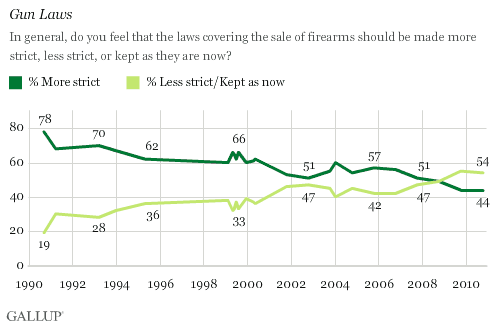
The downward trend in support for stricter gun control stalled briefly in 1999 after the Columbine High School massacre; however, the slight increase in support for stricter gun laws seen at that time (to 66%) proved temporary. The general downward trend in support for stricter gun laws has continued even though several high-profile civilian gun crimes, including the 2002 Washington, D.C.,-area sniper attacks, a 2005 shooting at an Indian reservation in Minnesota, a 2007 shooting at a Nebraska shopping mall, the Virginia Tech massacre in 2007, and shooting rampages in 2009 in Alabama and at a Binghamton, N.Y., citizenship center, have occurred over the past decade.
The same pattern is seen with respect to banning average Americans from owning handguns. Support for that proposal has fallen by one-third over the past two decades.
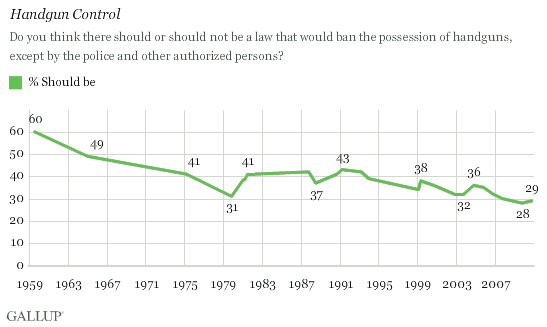
U.S. Slightly More Polarized in Recent Years
The Tucson shootings took place at a political event sponsored by Giffords, a Democrat. Authorities believe that Giffords, the first person shot by the gunman, was the primary target. The attempted assassination of a sitting member of Congress raises questions about the possible impact of what many characterize as a divisive and partisan political environment in the country.
Arizona, the location of the shootings, has its own set of political realities, including continuing controversy over the state's illegal immigration law. Nationally, recent Gallup analyses show that the U.S. ideological structure has become at least slightly more polarized since about 2000. Americans who identify with the Republican Party are increasingly likely to call themselves conservative rather than moderate. Those who identify with the Democratic Party are increasingly likely to view themselves as liberal rather than moderate.
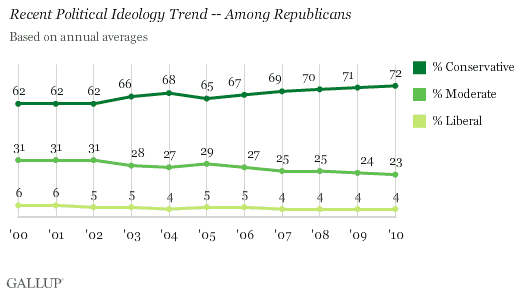
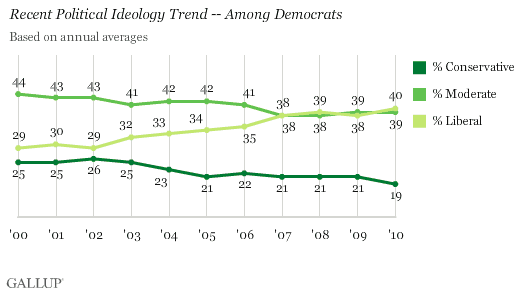
However, in terms of party identification more broadly, the percentage of Americans identifying as politically independent nationally in 2010 -- 38% -- was within one percentage point of the record high in Gallup trends since 1988, thus suggesting less political polarization. The percentages of partisans -- both Republicans and Democrats -- were at or near record lows.
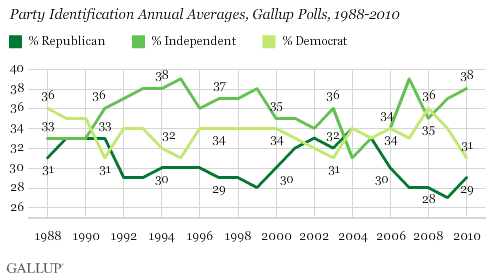
At the same time, recent Gallup polling suggests that Americans, perhaps cognizant of the polarized nature of political dialogue today, tilt toward a position that favors less polarization and more compromise among the nation's political leaders. In Gallup's Jan. 7-9 survey, 47% of Americans said they were most in favor of political leaders compromising to get things done rather than sticking to their principles, while 28% put themselves on the other end of the scale, advocating that political leaders stick to principles regardless of how little gets done. These results are very close to what was measured in November.
More Americans View Federal Government as Threat
The Tucson shootings have focused attention on the assumption that fanatics are moved to take actions such as shootings and bombings against federal targets because of a growing antipathy toward, if not hatred for, the federal government.
Almost half of Americans say they perceive the federal government to be an "immediate threat to the rights and freedoms of ordinary citizens," and this percentage is up in recent years.
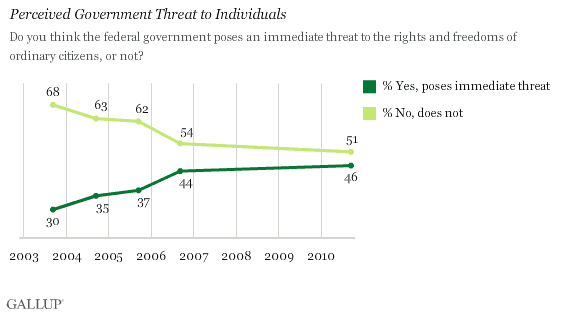
Those who responded that the government does pose an immediate threat were asked to explain their position.
As Gallup said in its analysis last October, "Many of the responses were fairly general in nature -- the government is too big, too involved in people's private lives, or is socialist. However, some mention very specific reasons, such as perceived violations of their First and Second Amendment rights, and the healthcare law."
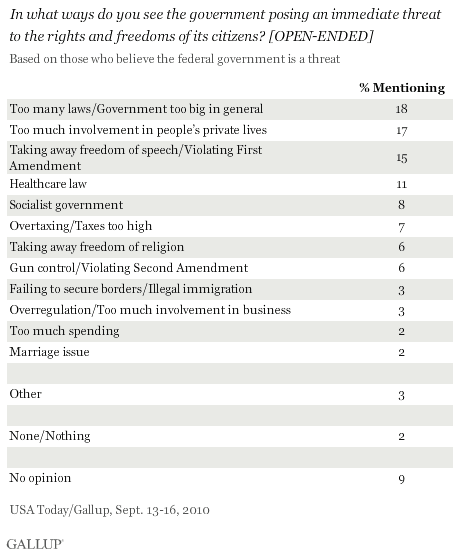
Further analysis of the trend in these responses suggests that perceptions of the "threat" the federal government poses are quite partisan in nature. When George W. Bush was president, Democrats were more likely to say the federal government posed an immediate threat. With Barack Obama as president, the partisan response pattern has flipped, and Republicans are now more likely to say the federal government is an immediate threat.
A record-high 59% of Americans this past fall also indicated that the federal government "has too much power."
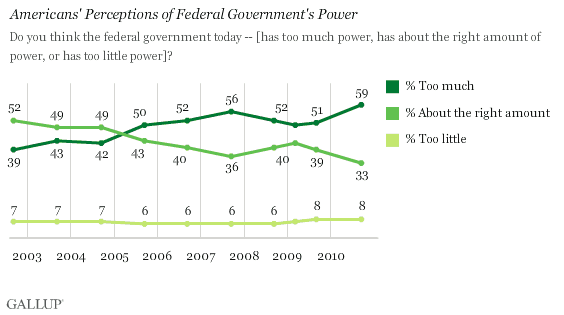
Marijuana
The accused shooter in Tucson has been characterized in several news reports as being a heavy marijuana user. Whether that was a factor in his mental state remains to be seen, but it could figure prominently in public discussion about his crime, and could conceivably affect public support for legalizing marijuana.
Gallup trends show that public opinion has been shifting in favor of legalizing marijuana, and is now at its most tolerant in the history of Gallup polling on the subject, since 1969. Just under half of Americans polled on this in October 2010, 46%, said marijuana use should be legal.
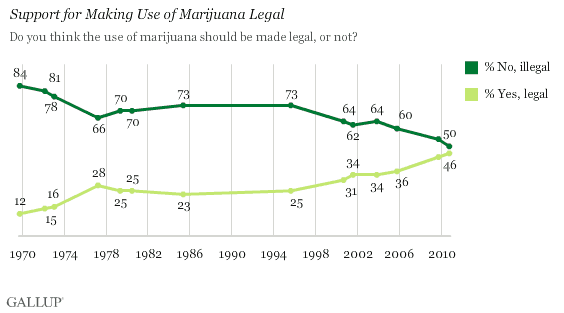
Implications
Prior to the Arizona shootings, Americans, by a small margin, were against further increases in gun control laws and were divided in their views on legalizing marijuana, while just under half viewed the federal government as a major threat. Additionally, Gallup trends show that Republicans and Democrats have gradually been moving further apart on the political spectrum -- with fewer and fewer moderates in either group.
The initial media and political reaction to the shootings has given all of these issues renewed importance, and it remains to be seen whether Americans will hold firm to their attitudes or shift in some meaningful ways. The history of public opinion on gun control suggests that a major gun-related crime such as this will have little lasting impact on Americans' views about gun laws, but it is too soon to be saying that will be repeated in this case.
Survey Methods
Gallup surveys 1,000 national adults, aged 18 and older, every day and also conducts additional surveys. In most cases, the maximum margins of sampling error are ±2 to ±4 percentage points. For detailed survey methods on any results reported here, please visit the original story.
Interviews are conducted with respondents on landline telephones (for respondents with a landline telephone) and cellular phones (for respondents who are cell phone only).
In addition to sampling error, question wording and practical difficulties in conducting surveys can introduce error or bias into the findings of public opinion polls.
For more details on Gallup's polling methodology, visit www.gallup.com.
